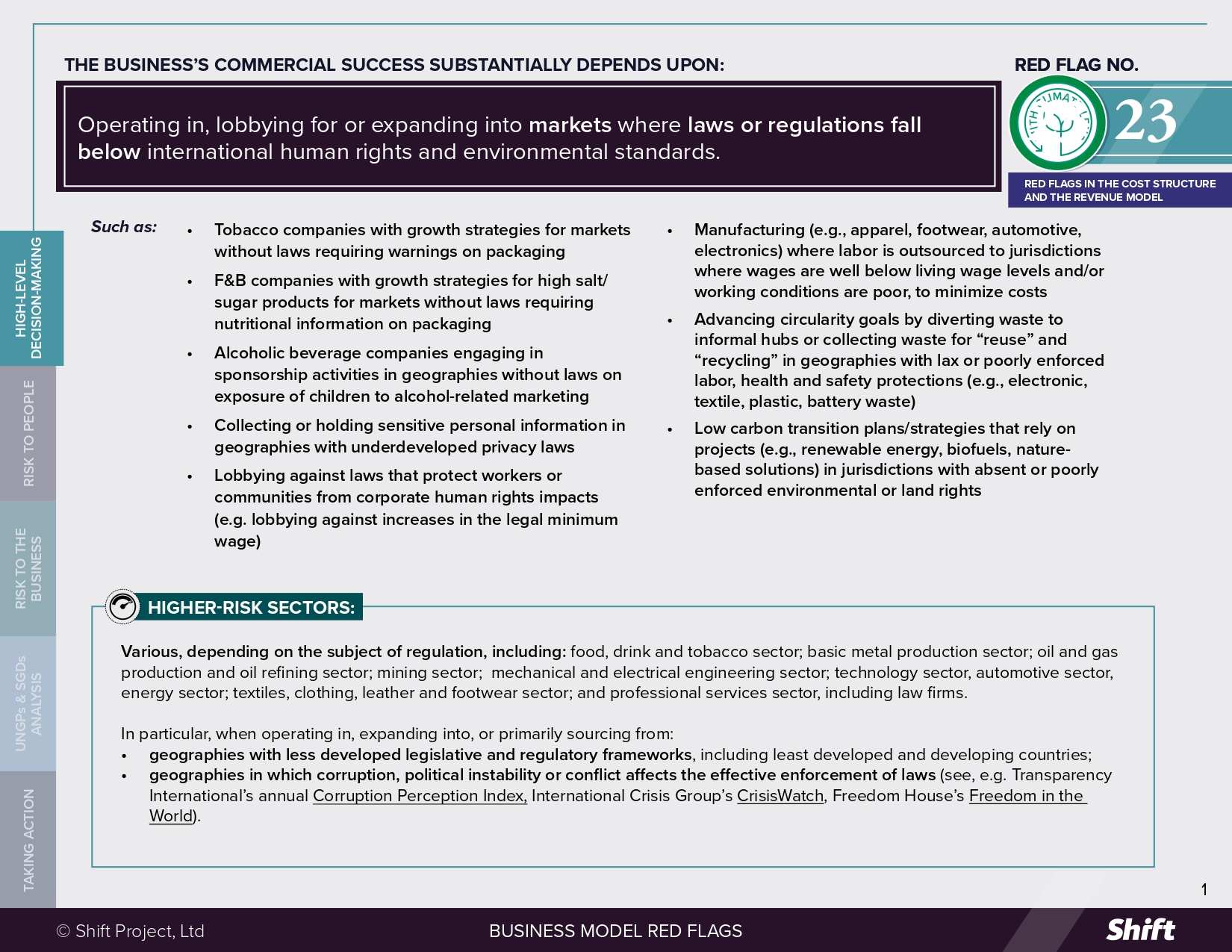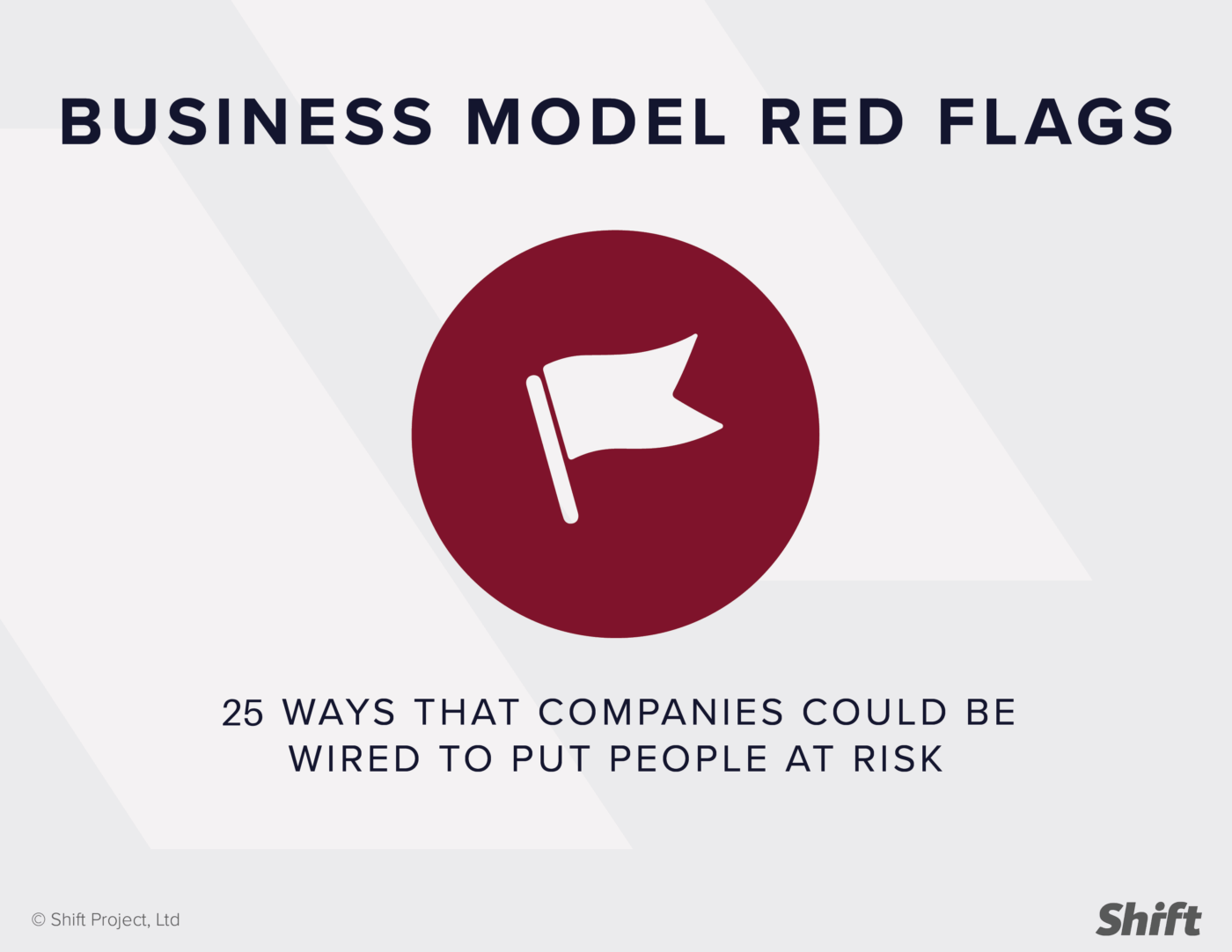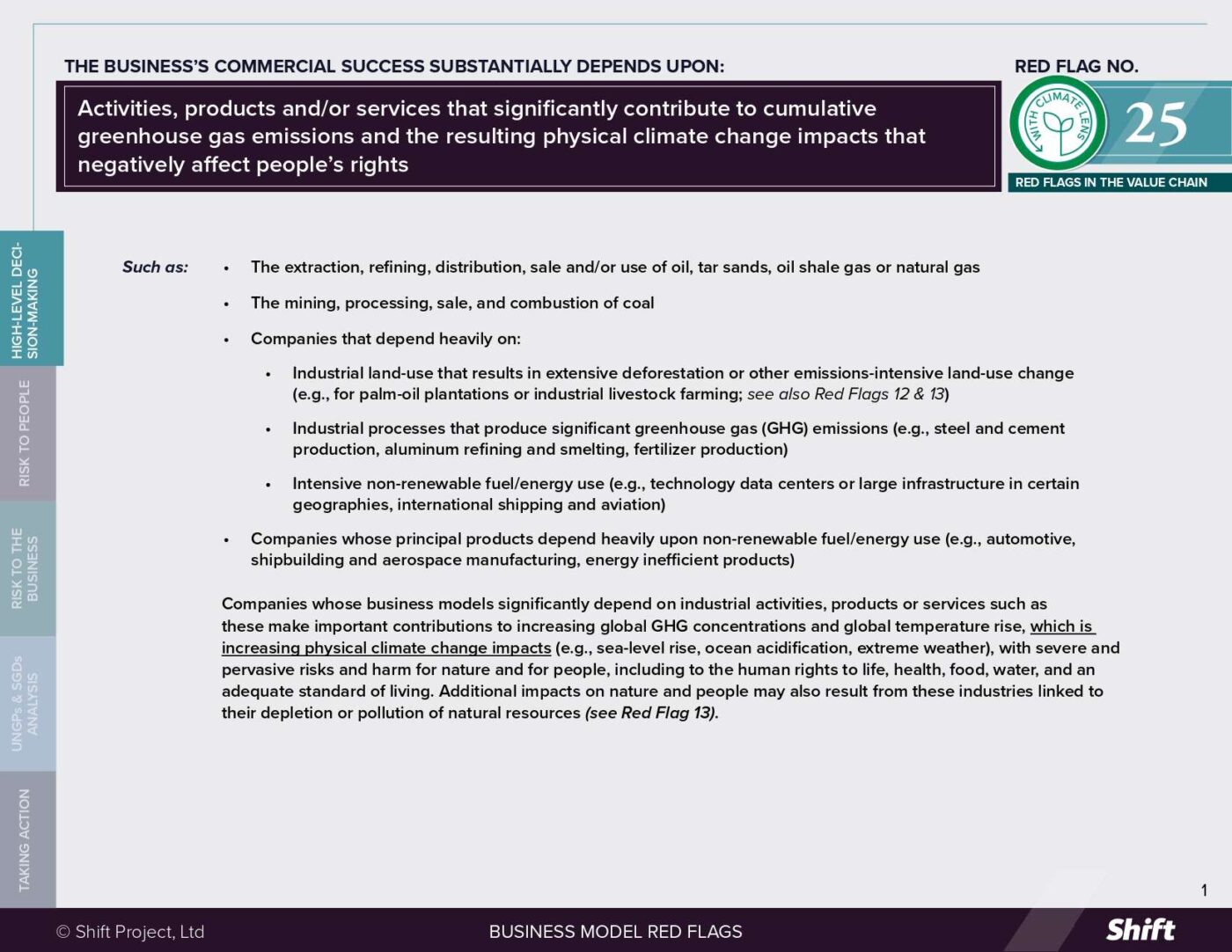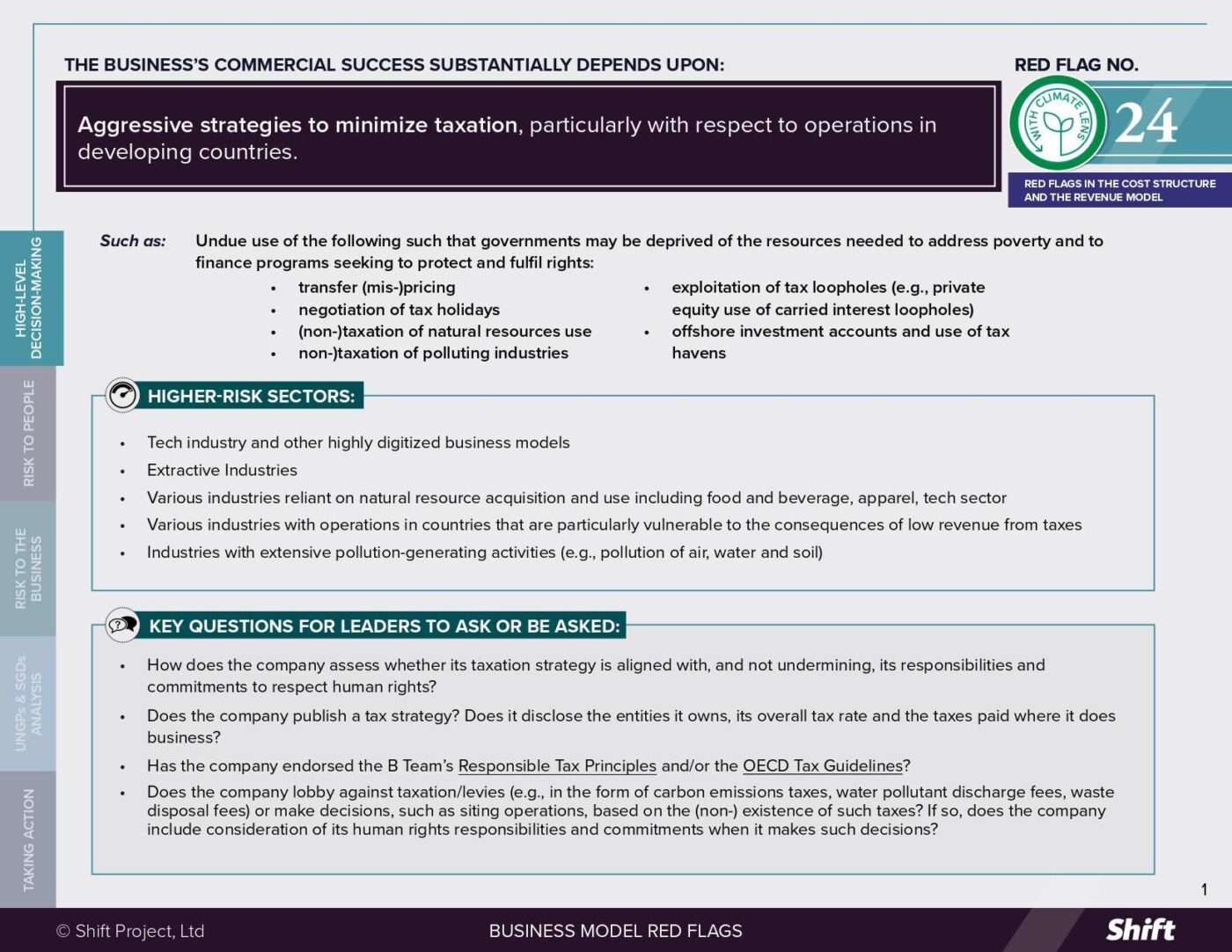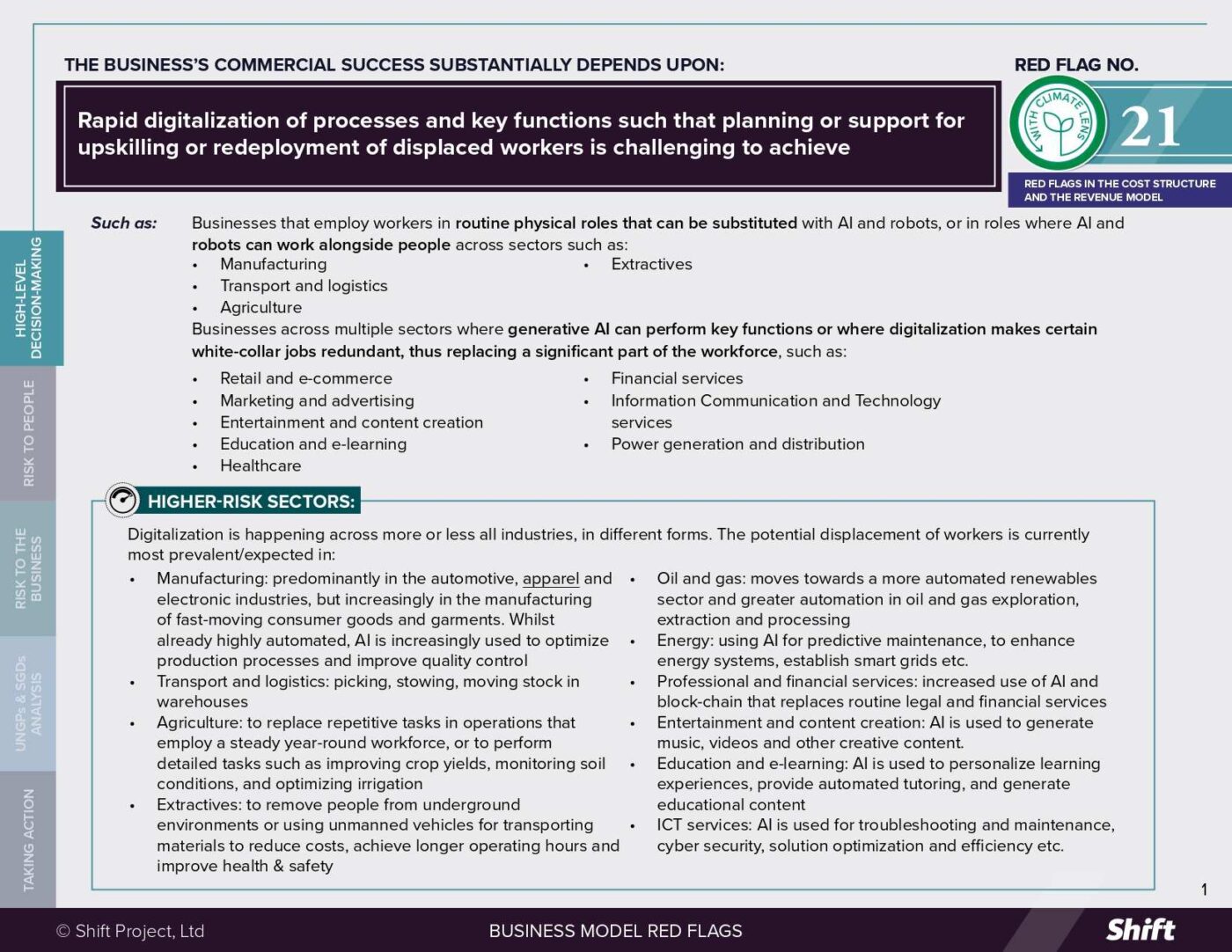RED FLAG # 23
The business’s commercial success substantially depends upon: operating in, lobbying for or expanding into markets where laws or regulations fall below international human rights and environmental standards
For Example
- Tobacco companies with growth strategies for markets without laws requiring warnings on packaging
- Food and beverage companies with growth strategies for high salt/ sugar products for markets without laws requiring nutritional information on packaging
- Alcoholic beverage companies engaging in sponsorship activities in geographies without laws on exposure of children to alcohol-related marketing
- Collecting or holding sensitive personal information in geographies with underdeveloped privacy laws
- Lobbying against laws that protect workers or communities from corporate human rights impacts (e.g. lobbying against increases in the legal minimum wage)
- Manufacturing (e.g., apparel, footwear, automotive, electronics) where labor is outsourced to jurisdictions where wages are well below living wage levels and/or working conditions are poor, to minimize costs
- Advancing circularity goals by diverting waste to informal hubs or collecting waste for “reuse” and “recycling” in geographies with lax or poorly enforced labor, health and safety protections (e.g., electronic, textile, plastic, battery waste)
- Low carbon transition plans/strategies that rely on projects (e.g., renewable energy, biofuels, nature-based solutions) in jurisdictions with absent or poorly enforced environmental or land rights
Higher-Risk Sectors
Various, depending on the subject of regulation, including: food, drink and tobacco sector; basic metal production sector; oil and gas production and oil refining sector; mining sector; mechanical and electrical engineering sector; technology sector, automotive sector, energy sector; textiles, clothing, leather and footwear sector; and professional services sector, including law firms.
In particular, when operating in, expanding into, or primarily sourcing from:
- geographies with less developed legislative and regulatory frameworks, including least developed and developing countries;
- geographies in which corruption, political instability or conflict affects the effective enforcement of laws (see, e.g. Transparency International’s annual Corruption Perception Index, International Crisis Group’s CrisisWatch, Freedom House’s Freedom in the World).
Questions for Leaders
- Has the company assessed whether its climate strategies – including its climate transition or circular economy strategies – could succeed without any reliance on these gaps in legal frameworks?
- Where impacts on people connected to the business arise in a geography of manufacture or sourcing, does the company undertake a root cause analysis and seek to understand whether and how the company’s business model creates a reliance on, e.g. labor/wage conditions that give rise to these risks?
- How does the company explain applying different standards related to human rights and the environment in different jurisdictions?
- How does the company know whether its lobbying activities on regulation are aligned with human rights principles, policies and commitments and consistent across functions and locations?
- Has the company ever supported new regulations relevant to human rights or health protections in its sector or operations?
- How has the company assessed whether the regulations it has opposed would have helped improve informed choice and/ or human rights, and how and to whom does it explain its conclusions?
How to use this resource. ( Click on the “+” sign to expand each section. You can use the side menu to return to the full list of red flags, download this Red Flag as a PDF or share this resource. )
Understanding Risks and Opportunities
Risks to People
Where companies operate in or source responsibly from non-home markets, they can be a catalyst for growth and prosperity. However, where the business model is substantially dependent on gaps in legal frameworks that may not exist in their home market, the company can be seen to be exploiting these governance gaps at this risk of impacts on people:
“The root cause of the business and human rights predicament today lies in the governance gaps created by globalization -between the scope and impact of economic forces and actors, and the capacity of societies to manage their adverse consequences. These governance gaps provide the permissive environment for wrongful acts by companies …”
— Protect, Respect and Remedy: A Framework for Business and Human Rights, UN Doc A/HRC/8/5 (7 April 2008)
Companies exploiting such gaps may engage in:
-
Practices associated with maintaining this business model feature risk perpetuating a “race to the bottom,” as countries compete with lower regulatory standards to attract corporate investment.
-
This may manifest, for example, with the siting and re-siting of operations or sourcing in locations with no or low minimum wages or inadequate labor or environmental protections, affecting peoples’ right to health, right to a family life, right not to be subjected to forced labor and numerous other impacts. The impact on individuals working for suppliers of foreign brands in geographies where legal protections are weaker has been well documented, including for examples in this study of Female Migrant Workers in Bangalore’s Garment Industry. Other examples include siting call centres in jurisdictions with underdeveloped overtime laws and worker protections; sourcing electronics from jurisdictions with weaker migrant workers protections or collective bargaining protections; or moving factories over borders where there is weak enforcement of labor standards.
-
In its 2015 report, Human Rights Watch documented how Cambodia’s rise as a garment manufacturing hub was enabled by low wages and favorable trade conditions, but sustained in part through systemic labor rights abuses. The report discusses widespread use of short-term contracts to discourage organizing, failure to enforce labor laws, suppression of independent unions, and impunity for abusive practices—all of which helped maintain Cambodia’s competitive position in global supply chains, attracting foreign business.
-
-
Lobbying against measures or laws that protect people from human rights impacts, for example lobbying against:
-
(increased) minimum wage laws, affecting among other things, the right to just and favorable conditions of work, including decent remuneration;
-
Indigenous title to land affecting Indigenous Peoples’ rights;
-
restrictions on emissions into land, sea and air, affecting the right to an adequate standard of living and to a clean, healthy and sustainable environment;
-
laws that support informed choice or plain packaging/non-marketing of harmful products such as cigarettes, affecting the right to health.
-
-
Legal strategies that prevent the state from protecting people from human rights impacts (potentially various), for example:
-
seeking to use investment treaties (including stabilization clauses) and closed arbitration processes to limit states’ abilities to enact or amend legislation or regulations that increase human rights protection;
-
seeking to enforce intellectual property rights against public health imperatives.
-
- Climate transition or circular economy strategies that hinge on exploitative land/resource use, where there are no, or poorly enforced, labor/environmental laws or informal labor arrangements, for example:
- land acquisition/use to facilitate renewable energy or biofuel cultivation in geographies where land ownership or resource use may be contested, with implications for Indigenous Peoples’ and community land rights, as well as human rights defenders (see also Red Flag 12)
-
transitioning from sourcing fossil fuels to sourcing biomass for electricity generation without measures to address health and social impacts disproportionately experienced by “poor, Black and rural communities in the South” (see also Red Flag 13)
-
relying on informal labor in recycling hubs (e.g., for EV battery component recovery) or other waste recovery/collection operations (e.g., “waste pickers”) in geographies with absent or poorly enforced labor laws and hazardous working conditions (see also Red Flags 17 and 18)
-
sourcing critical minerals (e.g., cobalt, copper, lithium) or other primary materials (e.g., polysilicon and rare earth elements) needed for low carbon and digitalization technologies from operations linked to child or forced labor, unsafe working conditions and local environmental degradation (see also Red Flag 14)
-
relying disproportionately on nature-based solutions or carbon offset projects located in jurisdictions with poor or poorly enforced laws and regulations around land, labor and Indigenous Peoples, resulting in negative impacts on workers and communities (see also Red Flag 14)
Risks to the business
-
Reputational and operational: Risks arise due to inconsistencies between what the company says in public and in private regarding regulatory protections, and in what it does in different parts of the world based on different levels of regulatory protection. Reputations may also be open to attack where the company invests considerable resources in weakening human rights or environmental protections. Some examples of where these types of risks have arisen include:
-
Kellogg’s attracted negative attention when it sued the Mexican government over a labelling policy requiring food manufacturers to include warning labels on the front of any boxes they sell in Mexico to educate consumers on excess sugar and fat. Similarly in the USA in 2023, major food manufacturers including General Mills, Kellogg’s, Conagra, and trade bodies like the Consumer Brands Association strongly opposed updated FDA proposals restricting the “healthy” label for foods high in added sugars, sodium, or fats. They argued the rules violated First Amendment rights and unfairly targeted nutrient-dense foods. Media highlighted that corporate claims were “drawing on big tobacco’s playbook,” with critics pushing back on potential conflicts of interest and misalignment with public health goals.
-
The Guardian reported on a leaked email sent by a senior executive from Philip Morris International regarding their lobbying plans to counter the World Health Organization’s efforts to crack down on vaping by young people and further smoking restrictions.
-
The Association of Convenience Stores (ACS), which includes major UK supermarkets like Sainsbury’s and Asda, has lobbied UK MPs to weaken or block a planned ban on disposable vapes, which aims to address the negative health impacts of disposables for young people and other vulnerable users. Public health groups have again argued that this behavior is “straight from the playbook of Big Tobacco”.
-
Reputational, regulatory and financial risks:
- As part of its climate change strategy, Drax Group transitioned from a coal-fired power generator into Europe’s largest biomass energy producer. In lieu of coal, the company now sources and burns wood pellets—often from mature forests in the U.S. and Canada. Advocates from civil society organizations (CSOs) have argued that the mills that process these pellets are disproportionately located in low-income, predominantly Black communities, where emissions of particulate matter and VOCs have been linked to respiratory illness. As a result, the company has faced reputational impacts (it is the subject of several CSO campaigns, such as StopBurningTrees.org, BankTrack, Just Transition Wakefield), regulatory action (in 2021, one of their US-based wood pellet facilities faced a USD2.5 million air pollution fine) and been dropped from sustainable investment indices. The company is also the subject of regulatory scrutiny, as they continue to lobby with the objective of influencing the UK’s renewable energy regulatory support program in their interests.
Legal and financial risk:
- Where a company mounts an unsuccessful legal challenge to government regulation aimed at public protection, it may face financial penalties, as in the case of tobacco company Philip Morris International, which was ordered to pay the Australian government millions of dollars after unsuccessfully suing the nation over its plain-packaging laws.
- A Florida court ordered Chiquita Brands International to pay $38 million to the families of eight men that were murdered by paramilitary forces financed by the company to facilitate their operations in Colombia in the absence of local law enforcement capabilities, which company executives cited as “the cost of doing business in Colombia”.
- Meta has faced civil society scrutiny, as well as a $150 billion class-action lawsuit and a U.S. Securities and Exchange Commission whistleblower complaint related to the platform’s expansion into Myanmar, where it has been accused of playing a pivotal role in the dissemination of hate speech that fueled violence against the Rohingya people. The accusations tie back to their alleged exploitation of weak governance and institutions.
- Financial risks: can arise where investors consider companies’ attempts to influence public policy in their investment decisions. For example:
-
US-based Trillium Asset Management reportedly monitors the levels and recipients of corporate giving, corporate policies on political contributions and membership of industry (lobbying) associations as part of their background research for stock selection in their socially responsible investment funds.
-
In 2022, Netflix’s shareholders approved a proposal on enhanced lobbying disclosure and oversight (garnering 60% support from the company’s shareholders) led by Boston Common Asset Management.
-
During the 2021 shareholder voting season, a series of shareholder proposals seeking stronger disclosure of how a company’s climate lobbying aligns with the Paris Agreement won majority votes from the shareholders of Delta Air Lines, Phillips66, Norfolk Southern Corp, ExxonMobil, and United Airlines. Further, a shareholder resolution against Nippon Steel Corporation in June 2024 seeking enhanced transparency on lobbying expenditures and positions garnered nearly 30% of the shareholder vote indicating growing concern of this issue in Asia. (see also Red Flag 25)
-
What the UN Guiding principles say
Under the UN Guiding Principles on Business and Human Rights, the corporate responsibility to respect human rights “exists independently of States’ abilities and/or willingness to fulfil their own human rights obligations, and … exists over and above compliance with national laws and regulations protecting human rights” (Principle 11, Commentary). In other words, “all business enterprises have the same responsibility to respect human rights wherever they operate” (Principle 23, Commentary), whether or not they have a domestic legal obligation to do so. As such, adopting an inherently uneven, compliance-based approach risks breaching the company’s responsibility in places where laws do not meet internationally accepted human rights standards.
The UNGPs note that companies should, “strive for coherence between their responsibility to respect human rights and policies and procedures that govern their wider business activities and relationships [including] …. lobbying activities where human rights are at stake” (Principle 16, Commentary).
Where the company actively lobbies against or takes action to constrain laws that have the practical effect of furthering respect for human rights, it risks contributing to human rights impacts, whether as a sole contributor or as a result of the aggregate contribution of several actors.
Where a company is benefiting from an absence of protection of rights in the countries where it operates, it may be directly linked to impacts; where it is aware of this and does nothing, it may, depending on a number of factors, be considered to be contributing to the impacts.
Possible Contributions to the SDGs
Addressing impacts on people associated with this red flag indicator can contribute to a range of SDGs depending on the impact concerned, for example:
-
SDG 3: No poverty, in particular Target 3.5: strengthen the prevention and treatment of substance abuse, including narcotic drug abuse and harmful use of alcohol; and Target 3.10: strengthen the implementation of the World Health Organization Framework Convention on Tobacco Control in all countries, as appropriate.
-
SDG 8: Decent Work and Economic Growth, in particular Target 8.5: by 2030, achieve full and productive employment and decent work for all women and men, including for young people and persons with disabilities, and equal pay for work of equal value.
-
SDG 12: Responsible Consumption and Production, in particular Target 12.2: Sustainable Management and Use of Natural Resources and Target 12.5: by 2030, substantially reduce waste generation through prevention, reduction, recycling and reuse.
-
SDG 13: Take urgent action to combat climate change and its impacts, in particular Target 13.2 integrate climate change measures into national policies, strategies and planning and Target 13.4 implement the UN Framework Convention on Climate Change.
-
SDG 16: Peace, justice and strong institutions, in particular: Target 16.7: ensure responsive, inclusive, participatory and representative decision-making at all levels; and Target 16.10: ensure public access to information and protect fundamental freedoms, in accordance with national legislation and international agreements.
Taking Action
Due Diligence Lines of Inquiry
-
Do we have a policy on when and how we will lobby against regulatory initiatives that include provisions aimed at access to information, improving consumer health or protecting other human rights? Are we aware of lobbying being undertaken on our behalf via trade associations and have we assessed those positions in light of our own commitments and responsibilities?
-
Have we assessed whether and to what extent our engagements with governments on regulatory developments are in line with our responsibility to respect human rights and the environment and enable governments to introduce human rights or environmental protections?
-
Have we examined our lobbying activities in light of our own human rights commitments and strategies?
-
Have we taken action to address any misalignments between our climate change lobbying and/or the climate change lobbying activities of our trade associations, coalitions, alliances or funded thinktanks and our publicly stated climate commitments?
-
-
Do our government affairs team engage routinely with our corporate responsibility/ sustainability/ human rights teams, with a view to internal alignment?
-
Where we use external lobbying organizations, are our corporate responsibility/ sustainability/ human rights team consulted on the terms of their mandate?
-
Do we disclose our position on key public policy issues? Do we reveal our external memberships, donations and methods of influence? If not, why not?
-
Do we disclose our operations (inclusive of tax activities) and primary sourcing countries across different geographic jurisdictions? If not, why not?
Mitigation Examples
-
Applying purpose and principles to lobbying activities:
-
In 2017 Campbell’s Soup withdrew from the Grocery Manufacturers Association citing “our purpose and principles,” including positions on food labelling. When the United States Food and Drug Administration agreed to extend a deadline for food and beverage companies to introduce a “Nutrition Facts Panel,” the company announced it was “continuing to strive to meet the original deadline.”
-
AP7, BNP Paribas Asset Management and the Church of England Pensions Board collaborated to develop The Global Standard on Responsible Climate Lobbying, which is intended to bring about transparency and accountability for the commitment of investors and companies to responsible climate lobbying.
-
In 2024 and 2025, Unilever undertook a Climate Policy Engagement Review to assess the degree of alignment between the company’s climate policy positions and the positions of the trade associations to which the company is a member. Following the review, the company has publicly committed to rectifying the misalignments, including using its leverage to urge more proactive climate policy positions from the industry bodies with which it works. As a result of its efforts, Unilever was ranked as the highest-scoring company by InfluenceMap, which annually tracks corporate climate lobbying behavior, and, as of May 2025, remains the highest scoring company.
-
Recent CEO Water Mandate initiatives (Net Positive Water Impact and Forward Faster Initiative) are underpinned by its Principles for Responsible Water Policy Engagement, which speak to the manner in which companies can responsibly engage on water-related policy.
-
-
Contributing to a regulatory environment that enables respect for rights:
-
In 2020, 101 investors came together under the Investor Alliance for Human Rights, to call on all governments to develop, implement and enforce mandatory human rights due diligence requirements for companies headquartered or operating within their own jurisdictions or, where appropriate, to further strengthen these regulatory regimes where they already exist. The IAHR also hosts an EU-specific Regulations Thematic Investor Group which aims to influence EU sustainability legislation.
-
Oil and gas companies have jointly pressed a government to improve transparency requirements before proceeding with bids for concessions, in order to level the playing field and avoid human rights performance becoming a competitive issue. (See Shift’s Using Leverage guide at p. 22).
-
The Extractive Industries Transparency Initiative is a multistakeholder initiative — involving governments, companies, and civil society — focused on promoting transparency in the oil, gas, and mining sectors. Membership is voluntary, but membership requires public reporting of payments, contracts, and industry data, with the intent of improving oversight of natural resource revenues, improving, government accountability and enabling more informed public participation in decisions that affect peoples’ livelihood and environments.
-
The Bangladesh Accord on Fire and Building Safety, signed in 2013 after the Rana Plaza factory collapse, is a legally binding agreement between global garment brands, trade unions, and NGOs to improve workplace safety in Bangladesh’s garment sector. It established independent factory inspections, public reporting, and mechanisms for workers to raise safety concerns. In 2023 a renewed International Accord was signed and, effective since November 2023, is a framework agreement for implementing country programs in Pakistan, Bangladesh and any future programs in other garment producing countries.
-
In 2014, eight apparel brands wrote to the Cambodian deputy prime minister and the chairman of the local Garment Manufacturers Association to say they were “ready to factor higher wages” into their pricing.
-
-
Examples of sector-specific collaborative initiatives:
-
The Voluntary Principles on Security and Human Rights (VPSHR), launched in 2000, is a voluntary, multi-stakeholder initiative—comprising governments, extractive and energy companies, and NGOs—that offers guidance to ensure security operations respect human rights. It establishes three core areas: risk assessment, and protocols for engaging with both public and private security providers—including proportional use of force, human rights training, credible investigation of abuse allegations, and regular community consultation.
-
The Fair Circularity Initiative brings businesses, including Pepsico, TetraPak and Unilever, together to work toward respecting the human rights of workers within the informal waste sector, including through collaboration with local waste picker organizations in different regions.
-
In 2019, three leading apparel brands, a denim supplier, and a coalition of labor unions and women’s rights organizations signed an agreement to prevent and address gender-based violence and harassment in garment factories in Lesotho.
-
Alternative Models
-
Companies striving to ensure a living wage across their operations and supply chain seek to mitigate the effects of operations in countries in which there is no, or an inadequate, minimum wage. ACT (Action, Collaboration, Transformation) is an “agreement between global brands and retailers and trade unions to transform garment, textile and footwear industry and achieve living wages for workers through collective bargaining at industry level linked to purchasing practices.” Through industry-level collective bargaining in sourcing countries, companies seek to avoid competing with each other based on lower wages (and regulations that enable this), but rather on other factors.
-
Mondragon is a federation of worker-owned cooperatives based in Spain’s Basque Country, operating across manufacturing, retail, finance, and education sectors. Each of the federation’s 70,000 workers is a co-owner with equal voting rights and equitable profit sharing, with Executive pay capped relative to the lowest-paid worker. The model does not rely on relocation to lower standard jurisdictions, but instead emphasizes local employment and democratic governance.
Other tools and Resources
General
-
UNEP Finance Initiative Human Rights Toolkit for Financial Institutions helps financial institutions align their practices with the UN Guiding Principles on Business and Human Rights
-
Investor Alliance for Human Rights Investor Toolkit on Human Rights is for asset owners and managers to address risks to people posed by their investments.
Responsible policy & political engagement
-
Oxfam (2024) Right-sizing Corporate Voice: A briefing for business on responsible political engagement.
-
BSR (2019) Human Rights Policy Engagement: The Role of Companies details a human rights-supportive approach to public policy engagement.
-
The Good Lobby Tracker helps interested stakeholders to select appropriate methods and standards with assessing the political footprint and conduct of companies.
-
The Responsible Lobbying Framework outlines what responsible lobbying would look like and can act as a tool for evaluating a specific organization’s lobbying activities.
-
Global Standard on Responsible Corporate Climate Lobbying can help companies and investors to assess and ensure that lobbying efforts are directed towards the attainment of the Paris Agreement goals.
-
LobbyMap is a system for tracking corporate climate policy engagement
-
Transparency International Ireland (2015) Responsible Lobbying Guide was produced to promote better compliance with regulations and ethical principles by lobbyists in the private and non-profit sectors.
Fair Circularity
-
WIEGO Advocacy and Worker Education Hub provides education, toolkits, position papers and other resources to assist workers in informal employment to secure their rights.
-
Fair Circularity Initiative which is focused on how to respect rights in circular value chains
Sector-specific tools and resources
-
ACT (2023) Accountability and Monitoring Report is a comprehensive report that showcases collaborative efforts among brands and retailers to design, measure, and monitor transformative practices.
-
Swedwatch (2025) Human Rights Defenders at Risk in the Transition to Green Energy details how much of the renewable energy expansion is happening in countries with restricted civic space and weak human rights protections and how this puts communities, especially human rights defenders, at risk of harassment, legal persecution and violence.
Citation of research papers and other resources does not constitute an endorsement by Shift of their conclusions.

 Business Model Red Flags
Business Model Red Flags  Tool for Indicator Design
Tool for Indicator Design 